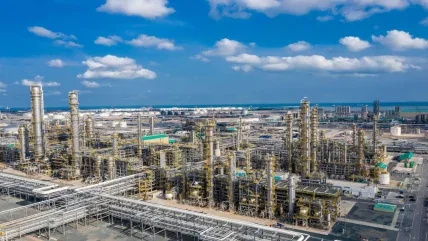
Petroliam Nasional Berhad (Petronas), Enilive, and Euglena have announced their final investment decision (FID) to develop a biorefinery in Malaysia.
The new facility will be situated within Petronas’ Pengerang Integrated Complex (PIC) in Johor.
Enilive, a subsidiary of the Italian energy firm Eni, and Euglena, a Japanese biotechnology company, will join Petronas in establishing a joint venture to construct and operate the biorefinery.
Euglena has the experience of constructing a biofuel production demonstration plant in Japan, with the objective of supporting biofuel development in the country.
Petronas Mobility Lestari (PMLSB), a Petronas subsidiary, and Enilive will be the largest shareholders in the venture.
Enilive CEO Stefano Ballista said: “The final investment decision for this project in Malaysia confirms Enilive’s commitment to biofuel production and marks a stepping stone to realising the company’s 2030 target of more than five million tons of biofuel production capacity per year, with the option to produce two million tons of SAF.
“Since 2014, Enilive has already been operating a biofuel production plant in Italy and recently started operating one in the United States. The collaboration with Petronas and Euglena will allow Enilive to enter the Asian market and establish a distinctive presence worldwide.”
The biorefinery is scheduled to begin operations in the second half of 2028. It will be capable of producing sustainable aviation fuel (SAF) and other biofuels such as Renewable Diesel/Hydrogenated Vegetable Oil (HVO) to meet the growing demands of the aviation and transportation sectors.
Construction of the facility is expected to start in the fourth quarter of this year.
Upon completion, the biorefinery will process approximately 650,000 tonnes of raw materials annually to produce SAF, HVO, and bio-naphtha. The feedstocks for the biorefinery will include used vegetable oils, animal fats, waste from vegetable oil processing, and potentially microalgae oils.
The facility will leverage Petronas’ integrated Pengerang Integrated Complex’s facilities and utilities, offering proximity to feedstock sources and access to major international shipping lanes.
The Pengerang Integrated Complex currently includes a multi-train refinery that processes imported crude oil into higher-grade fuels to meet Malaysia’s growing consumption demands. The refinery also produces feedstock for the adjacent steam cracker complex, which further processes these materials into raw inputs for the petrochemical complex.
The petrochemical complex then produces a range of products, primarily premium and specialised petrochemicals, used in the manufacture of high-demand, higher-end consumer goods.
Petronas refining, trading and marketing vice president Ahmad Adly Alias said: “As a leading energy solutions partner, this project goes beyond just buying and selling biofuels, but also cements our position in the value chain and provides a practical and sustainable solution to reduce carbon emissions, paving the way for a comprehensive bio-based ecosystem.
“By leveraging the strengths and expertise of our partners, we will help advance the bio-based global economy by providing practical, accessible and cleaner energy solutions to our customers around the world, especially in the Asia-Pacific region, which is in line with our Net Zero Carbon Emissions 2050 goal.”
The biorefinery will feature the Ecofining technology, developed by Eni in collaboration with Honeywell UOP, and will be designed for flexibility in feedstock processing and product output. This includes maximising SAF production for aircraft and HVO.
By using the Ecofining technology, Eni converted the two traditional refineries in Italy, located in Venice and Gela into biorefineries.



